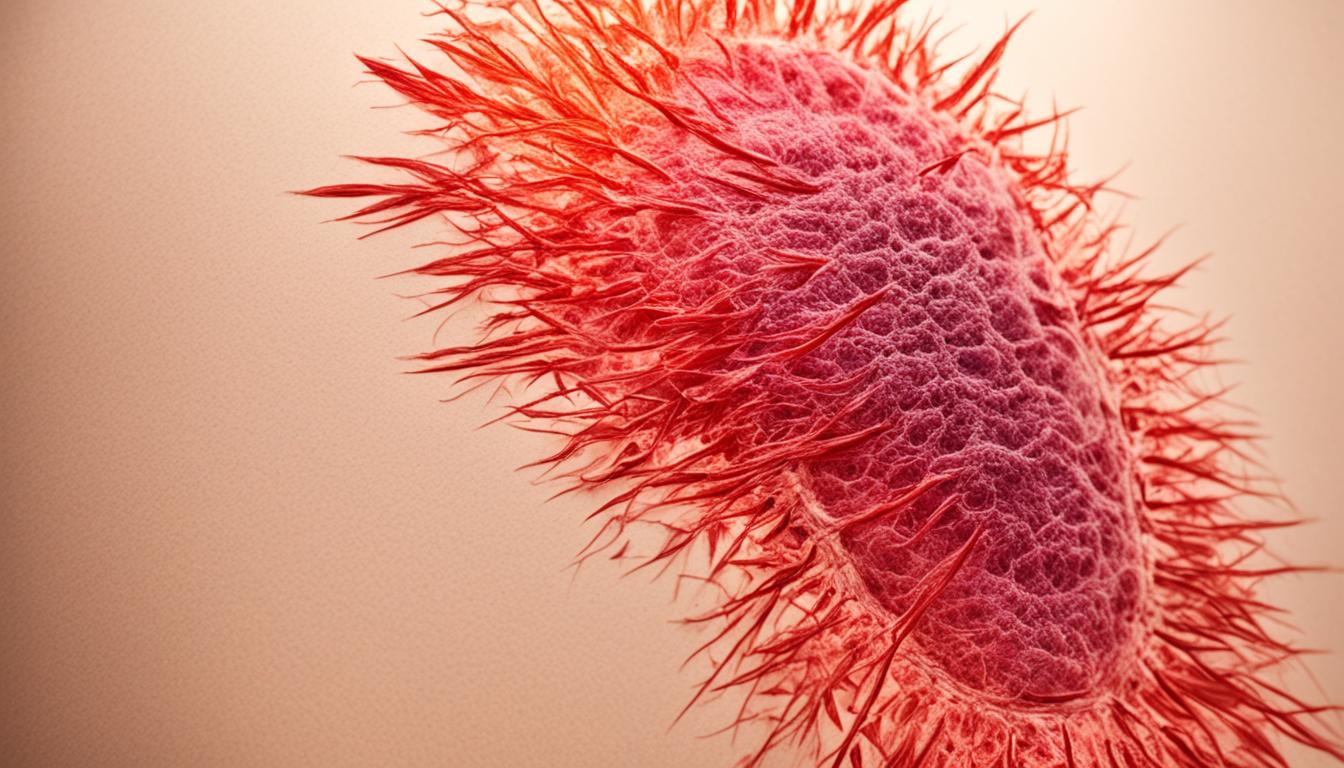Pruritis ani means anal itching. It causes a rash or irritation near the anal opening. This can lead to severe itching, burning, and pain. The most common reason for anal itching is skin irritation. This comes from stool or soap chemicals. Improper wiping and using dry toilet paper can also irritate the skin.
To manage anal itching, there are several approaches. These include using natural vegetable powder and practicing good water hygiene. You can also try moistened toilet paper and apply Vaseline. It is crucial to steer clear of commercial wet wipes and soap.
Key Takeaways:
- Pruritis ani, also known as anal itching, involves a rash near the anal opening.
- Main causes are irritation from chemicals in stool or soaps and improper hygiene.
- Treatments include natural vegetable powder, water hygiene, moistened toilet paper, and Vaseline.
- Avoiding commercial wet wipes and soap is important.
- Stem cell therapy might be a future treatment, requiring more research.
Causes of anal itching
Anal itching, or pruritis ani, is a bothersome issue causing discomfort. It’s important to know what leads to it to manage and prevent.
The main causes of anal itching are:
Irritation from Chemicals
Stool chemicals like bile salts can hurt the skin around the anus. They make it itchy and uncomfortable. Strong soaps and cleansers also harm the skin. They take away its natural oils, making it dry and itchy.
Improper Wiping Technique
Bad wiping after using the bathroom is a big reason for anal itching. Stool on toilet paper can leave a mess on the skin, causing irritation. Using dry toilet paper is not good enough to clean the skin, which can lead to dryness and irritation.
<!–
additional h3 header, if relevant
additional paragraph, if relevant
| Possible Causes of Anal Itching | Description |
|---|---|
| Irritation from stool chemicals | Chemicals in our stool, like bile salts, can irritate, leading to itchiness. |
| Use of harsh soaps | Strong soaps can remove natural skin oils, causing dryness and itchiness. |
| Improper wiping technique | Wiping poorly after using the bathroom can leave stool on the skin, causing irritation and itchiness. |
To stop anal itching, first find what’s causing it. Use gentle hygiene and mild cleansers. Stay away from things that irritate the skin. These steps can help lower the chances of getting anal itching and keep your skin healthy.
Treatment options for pruritis ani
Pruritis ani, or anal itching, can be very uncomfortable. Luckily, many treatment options can help lessen the itch. By finding the root of the issue and keeping clean, people can ease their discomfort.
1. Natural Vegetable Powder
Natural vegetable powder in liquid form is a great remedy for anal itching. It soothes the skin, lessening discomfort. It acts as a barrier and keeps the area moist, helping to heal.
2. Water Hygiene
Keep the anal area clean with water after every bowel movement. This washes away any stool remnants, lowering irritation. Patting dry with a soft towel or using a bidet is effective without harm.
3. Moistened Toilet Paper
Moistened toilet paper is good for those with anal itching. It’s gentle on the skin and removes stool residue better than regular paper. These wipes are easier on the sensitive skin.
4. Vaseline or Petroleum Jelly
Applying Vaseline or petroleum jelly once to thrice daily can lessen itching. They moisturize and shield the skin, stopping more irritation. It’s vital to use just a little to prevent issues with the anal glands.
5. Avoid Commercial Wet Wipes and Excessive Soap Use
Don’t use commercial wet wipes because they might make things worse. Go for mild, scent-free wet wipes or gentle baby wipes. Also, using too much soap isn’t good. It can make the skin drier and more irritated. If you must use soap, pick one that’s gentle and for sensitive skin, and use it only when needed.
Trying these options can help those with pruritis ani to better manage their symptoms. Always seek advice from a doctor for a specific diagnosis and treatment plan fitted to your needs.
Stem cell therapy for pruritis ani
Stem cell therapy is not widely used yet for Pruritis Ani. But, it shows potential as a future treatment. Stem cells can grow into different types of cells and fix damaged tissues. This means they might be able to help ease Pruritis Ani symptoms significantly.
Pruritis Ani, or anal itching, is very uncomfortable and irritating. With stem cell therapy, the goal is to repair the itchy skin. This could provide lasting relief from the itching and its effects.
But, more studies and trials are needed. We have to make sure stem cell therapy for Pruritis Ani is both effective and safe. Through this research, we aim to find new, effective ways to help people improve their quality of life.

